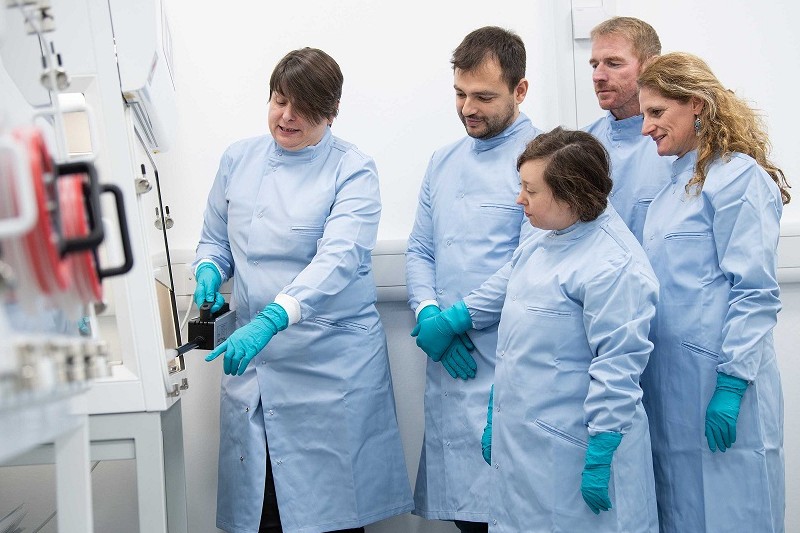
The University of Bristol’s new Infectious Diseases Containment Level 3 Laboratory Suite, supported in large part by alumni and friends, has opened this month. The CL-3 Lab is one of the highest security labs used in academic research in the UK, significantly increasing the University’s capacity for critical research and strengthening Bristol as a centre for excellence on dangerous pathogen research.
When the COVID-19 pandemic struck, University of Bristol alumni and friends provided vital support to help students through successive lockdowns and drive forward interdisciplinary research to understand and respond to the virus at pace. They also supported the development of two new high-security CL-3 laboratories – one for virology and one for bacteriology – which open for research this month. These laboratories will capitalise on a well-established interdisciplinary approach to the complex health challenges presented by Anti-Microbial Resistance (AMR), dengue virus, SARS and MERS, as well as supporting our COVID-19 research activity and enabling work on live HIV for the first time onsite.
The Infectious Diseases Laboratory Suite will facilitate this team science approach, bringing together sector-leading virology, immunology, and bacteriology researchers within a purpose-built facility. The new suite will accelerate areas of research excellence, expanding our capacity and enabling us to broaden the scope of our research to other infectious diseases of global significance.
The two new labs are connected by a technical space and changing room, and are equipped with advanced technologies, including microscopes, incubators, fridges, freezers, and an ARIA III cell sorter, allowing cutting-edge single cell analysis of immune responses to infection. The work undertaken with this new cell sorter will be of critical importance to vaccine design and the development of new therapies and will help inform public health policies.
Where our pre-existing CL-3 lab only had space to accommodate one researcher at any one time, placing serious limitations on the work undertaken, the new Infectious Diseases Suite trebles the University’s CL-3 capacity. This supports our continued collaborative and multidisciplinary research and enables the growth of an ambitious research agenda. Critically, it future proofs the University’s research infrastructure, enabling Bristol to respond quickly and at even greater scale to future threats presented by any viral or bacterial pathogen.

Ruth Massey, Professor of Microbial Pathogenicity, is currently working on human and bovine TB diagnostic projects. She says: ‘The new space gives us a base from which we can grow and make significant impact on these pieces of research, both of which are about to enter very exciting phases of validation with real life samples.
‘If our test on human TB proves to be as effective in the clinic as it does in the laboratory, then it will have global impact on diagnosis and treatment of this major health problem.
‘I’ve been trying to get this project off the ground for 10 years, so it’s fantastic that we are now up and running. A huge thank you to those who have made this laboratory possible.’
Other researchers who will be using the space imminently include Dr Laura Rivino, whose research explores how T cells contribute to protective immunity in the context of dengue virus and more recently COVID-19, and Dr Darryl Hill, Associate Professor of Infectious Diseases, whose research explores bacterial infections of the respiratory tract.
The new CL-3 bacteriology facilities will also enable a step change in our leading AMR research. Where researchers have previously had to use off-site laboratories when handling bacterial pathogens that require high-security containment – such as tuberculosis, bovis and Burkholderia pseudomallei – they can now remain onsite for the first time. This will fast track our leading work in AMR and its adjacency to the CL-3 virology lab will foster even closer collaboration, which is of critical importance in addressing the complexities of emerging pandemics.
Thanks to the support of our alumni and friends, including the Wolfson Foundation who have made a significant gift, these CL-3 Labs are transforming the University’s ability to work with dangerous pathogens, facilitate partnerships and support the diversification and expansion of bacteriology and virology research. Ultimately, they will enable researchers to accelerate their work, which will mean faster development of diagnostics and treatments.
The University of Bristol is hugely grateful for this remarkable support. We are proud to have commissioned a mural near our teaching laboratory space, by local artist David J McMillan, in recognition of the donors who have contributed to the new lab suite. Thank you.
